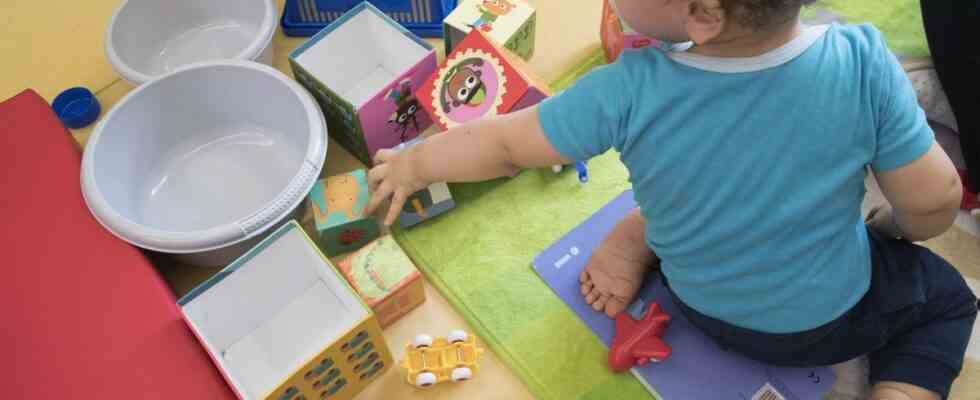The text message went out last Tuesday. “Strike in nurseries on Tuesday August 30. Risk of disrupted reception”. The style is telegraphic but the essence is there. The start of the new school year for municipal nurseries in Paris promises to be complicated to say the least. At the origin of the movement, the “lack of means which harms the quality of the collective reception of children”, indicates the renewable strike notice filed by the inter-union CGT-CFTC-UCP-FSU-FO.
“There are several hundred unopened cradles due to the lack of childcare assistants [AP]denounces Naouel Alcaix, general secretary of the CGT Petite Enfance 75 and signatory of the notice. We did the count, at the end of 2021, there were 427 assistants missing. The positions are budgeted, but there is no one to fill them, because it is not attractive and poorly paid. This is why, despite the recent passage of AP from category C to B, the inter-union is also calling for an increase in wages and obtaining the bonus from the Ségur de la santé.
A directional bonus
This last point crystallizes the tensions. Véronique Thoraillier, Unsa delegate for the Directorate of Family and Early Childhood (DFPE) whose union does not call for a strike but which supports the demands, explains the micmac to us: “With the second wave of Ségur, it was provided that childcare assistants can receive the bonus. However, since April 1, the town hall has created a public health department [DSP] where, for example, the APs of the PMI were transferred while the nursery assistants remained within the DFPE. And the municipality has decided to award the bonus only to DSP agents because they come under the medico-social sector, while we do the same job. This unequal treatment is all the more strongly felt as the bonus is significant compared to current salaries, namely 183 euros monthly when Véronique Thoraillier indicates receiving 2,100 euros net with nearly 40 years of seniority.
In addition to the low wages, this strike also reflects a malaise within a profession “not recognized, not valued”, according to the UNSA representative. Parisian crèches are caught in a vicious circle where working conditions degraded by the lack of staff fuel recruitment problems. If the CGT considers that the crèches are victims of a political choice since “Anne Hidalgo has the dough, at least for the Olympics”, tells us Naouel Alcaix, the Unsa is more measured: “the municipality hears us and recently for the first time, they admitted they had difficulty recruiting. »
The risk of less trained management
Nursery staff therefore fear a deterioration in the level of supervision of toddlers. According to the law, in a nursery, at least 40% of the workforce must be qualified. In Parisian establishments, the rate is much higher. For example, in a crèche welcoming about sixty children, there are two nursery nurses – a manager and her assistant -, two educators and twelve PAs, all of whom are considered to be qualified. Finally there are 3 agents in charge of laundry, cleaning and meals. Specialized agents may also be present from these crèches (ASC), holders of a CAP in early childhood, with a view to obtaining the AP diploma after a one-year training. But the unions fear that, with its staffing rate well above the legal threshold, the town hall, which did not respond to us in time, will have more and more recourse to these ASCs because they cost less and are easier to find only APs.
On the parents’ side, the concern is shared. At the Cité Lepage crèche, in the 19th arrondissement, a group of parents had sent a letter last March to the town hall of the sector and to the DFPE to denounce “an impossible situation” due to the non-replacement of absent professionals. “The complicated working conditions and the lack of staff are now obvious to parents,” the letter continues. “There have been a lot of schedule reductions even though the management was doing everything to try to accommodate everyone, comments Alexandrine, one of the signatories of the letter. This poses a problem with our work and some of us have had to hire babysitters to come and pick up their child earlier. »
“The first six years are essential”
“With the restricted hours, it is the organization for the family which is more complicated, abounds a young mother. I had to leave right on time, even early, from work to be on time for my son, and that’s quite uncomfortable with my employer. “This understaffed management also has consequences for the children cared for while “the first six years are essential”, judge Véronique Thoraillier, Unsa delegate for the Family and Early Childhood Department (DFPE). “As they are in small numbers, the professionals, despite their efforts, do not necessarily have the time and the resources to take care of the children. And, for example, they have less time for transmissions when we want to know how our child’s day went, ”continues the young mother.
At the start of the school year, working groups will be set up by the municipality to try to find a solution to this problematic situation. As for Véronique Thoraillier, she wants to be optimistic, to defend this “tremendous profession when it is done calmly”.

